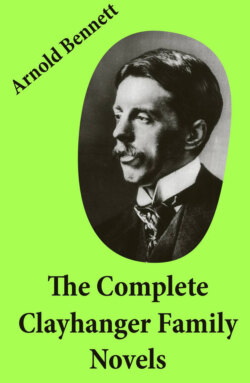Читать книгу The Complete Clayhanger Family Novels (Clayhanger + Hilda Lessways + These Twain + The Roll Call) - Arnold Bennett - Страница 74
На сайте Литреса книга снята с продажи.
Two.
ОглавлениеBy this time people had started to eat, but informally, as it were apologetically—Passover meals. Evening was at hand. The Clayhangers, later, had met at table. A strange repast! A strange father! The children had difficulty in speaking naturally. And then Mrs Hamps had come, ebulliently thanking God, and conveying the fact that the town was thrilled and standing utterly amazed in admiration before her heroical nephew. And yet she had said ardently that she was in no way amazed at her nephew’s coolness; she would have been surprised if he had shown himself even one degree less cool. From a long study of his character she had foreknown infallibly that in such a crisis as had supervened he would behave precisely as he had behaved. This attitude of Auntie Hamps, however, though it reduced the miraculous to the ordinary-expected, did not diminish Clara’s ingenuous awe of Edwin. From a mocker, the child had been temporarily transformed into an unwilling hero-worshipper. Mrs Hamps having departed, all the family, including Darius, had retired earlier than usual.
And now, on meeting his father and Big James and Miss Ingamells in the queer peace of the morning, in the relaxation after tension, and in the complete realisation of the occurrence, Edwin perceived from the demeanour of all that, by an instinctive action extending over perhaps five seconds of time, he had procured for himself a wondrous and apparently permanent respect. Miss Ingamells, when he went vaguely into the freshly watered shop before breakfast, greeted him in a new tone, and with startling deference asked him what he thought she had better do in regard to the addressing of a certain parcel. Edwin considered this odd; he considered it illogical; and one consequence of Miss Ingamells’s quite sincere attitude was that he despised Miss Ingamells for a moral weakling. He knew that he himself was a moral weakling, but he was sure that he could never bend, never crouch, to such a posture as Miss Ingamells’s; that she was obviously sincere only increased his secret scorn.
But his father resembled Miss Ingamells. Edwin had not dreamt that mankind, and especially his father, was characterised by such simplicity. And yet, on reflection, had he not always found in his father a peculiar ingenuousness, which he could not but look down upon? His father, whom he met crossing the yard, spoke to him almost as he might have spoken to a junior partner. It was more than odd; it was against nature, as Edwin had conceived nature.
He was so superior and lofty, yet without intending it, that he made no attempt to put himself in his father’s place. He, in the exciting moments between the first cracking sound and the second, had had a vision of wrecked machinery and timber in an abyss at his feet. His father had had a vision far more realistic and terrifying. His father had seen the whole course of his printing business brought to a standstill, and all his savings dragged out of him to pay for reconstruction and for new machinery. His father had seen loss of life which might be accounted to his negligence. His father had seen, with that pessimism which may overtake anybody in a crisis, the ruin of a career, the final frustration of his lifelong daring and obstinacy, and the end of everything. And then he had seen his son suddenly walk forth and save the frightful situation. He had always looked down upon that son as helpless, coddled, incapable of initiative or of boldness. He believed himself to be a highly remarkable man, and existence had taught him that remarkable men seldom or never have remarkable sons. Again and again had he noted the tendency of remarkable men to beget gaping and idle fools. Nevertheless, he had intensely desired to be able to be proud of his son. He had intensely desired to be able, when acquaintances should be sincerely enthusiastic about the merits of his son, to pretend, insincerely and with pride only half concealed, that his son was quite an ordinary youth.
Now his desire had been fulfilled; it had been more than fulfilled. The town would chatter about Edwin’s presence of mind for a week. Edwin’s act would become historic; it already was historic. And not only was the act in itself wonderful and admirable and epoch-making; but it proved that Edwin, despite his blondness, his finickingness, his hesitations, had grit. That was the point: the lad had grit; there was material in the lad of which much could be made. Add to this, the father’s mere instinctive gratitude—a gratitude of such unguessed depth that it had prevented him even from being ashamed of having publicly and impulsively embraced his son on the previous morning.
Edwin, in his unconscious egoism, ignored all that.
